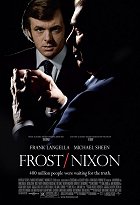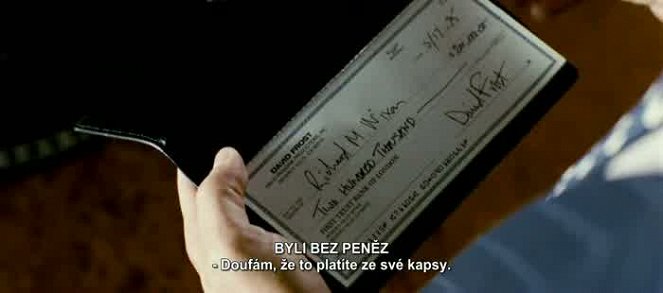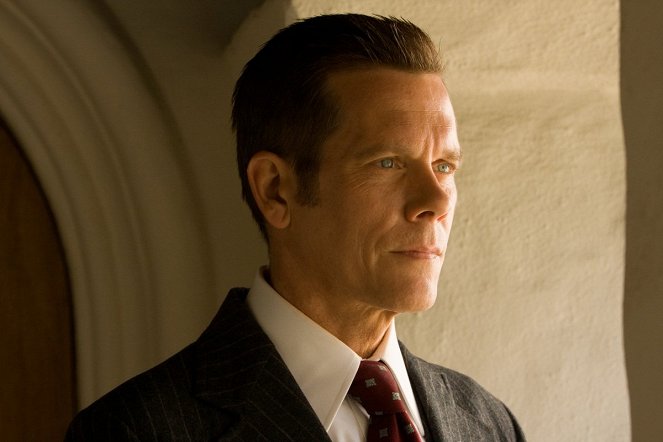Directed by:
Ron HowardCinematography:
Salvatore TotinoComposer:
Hans ZimmerCast:
Frank Langella, Michael Sheen, Sam Rockwell, Kevin Bacon, Matthew Macfadyen, Oliver Platt, Rebecca Hall, Toby Jones, Andy Milder, Kate Jennings Grant (more)VOD (1)
Plots(1)
When disgraced President Richard Nixon agreed to an interview with jet-setting television personality, David Frost, he thought he'd found the key to saving his tarnished legacy. But, with a name to make and a reputation to overcome, Frost became one of Nixon's most formidable adversaries and engaged the leader in a charged battle of wits that changed the face of politics forever. (official distributor synopsis)
(more)Videos (3)
Reviews (13)
Reflecting on one of the black shadows of American history while thoroughly dissecting diverse human characters, this two-hour conversation is propelled by Howard's reliably craftsman-like direction and the amazing acting performance by everyone (!) involved. Yet despite the exceptionalism of the supporting parts, it is ultimately the excellent Martin Sheen and his crackpot 1970s metrosexual who falls flat on his face, and especially (I’m not afraid to use the word) the brilliant Frank Langella, who do in fact carry the film. The way Langella inhabited the character of Richard Nixon - a tall but stooped man who has been whittled to the bone by two years of affairs, yet still has that dark sparkle in his eyes and the sharp tongue with which he can fend off opponents - reminds me in many ways of oil tycoon D. D. Lewis. The fact that Langella was politically overlooked in the Oscar race in favor of the homosexual Milk made me jump out of my chair. And finally, there’s Ron Howard - the religious conspiracy screaming is forgiven because the visual concept (excellent editing and cinematography) and overall swing bring the film to the absolute peak. Along with Stone’s W., this is one of the most interesting "political" films of recent times (maybe even years).
()
My Oscar favourite this year. After the awful The Da Vinci Code, Ron Howard must have had a fit of creativity and I applaud him. This film is one of the best political dramas in many years. It is engagingly shot, not boringly descriptive, on the contrary, through an interesting verbal TV duel between the two leading characters, it presents the socially tense period after the biggest stain on the political culture of the history of the United States, the Watergate affair (when a large part of the American society could not stomach Ford's amnesty on Richard Nixon's transgressions). With his piercing gaze, thoughtful diction and mesmerizing confidence, Frank Langella is about ten times more devilish than Nixon himself, and I hope he has a pleasant Oscar night.
()
Just the idea of making this like a boxing match with a “former world champion vs. a talent who remained in the limelight" is excellent. On the one hand it is a fight for atonement/forgiveness and on the other for an admission/apology. Sheen acts so well and he doesn’t let the phenomenal Langella steal the movie. But still, it has its faults. It is still just a regular Howard movie. In other words, a simplified fairytale, this time political. But the list of factual sins is just too long (and not just what the IMDb reviewers mentioned). Primarily Nixon’s tirade during his nighttime phone call, this scene is like comic book movies where the most villainous ever villain reveals his complete plan (including the weaker bits) for conquering the world. I understand that from a movie point of view this is essential and needed, but then the result is unavoidably fiction which has nothing to do with reality. I personally think that to leave out that phone call and stay with the real state of affairs would have been better. It would at least leave room for viewer imagination about whether Frost really got Nixon down on the floor on his own or whether this wasn’t just another brilliant move by Nixon, letting him leave the scene maintain a little self-respect and, in a way, fame.
()
In this film, everything works like a well-oiled Swiss watch of the highest quality. Both of the actors in the titular lead roles deliver excellent performances in a dialogue duel focusing on a detailed portrayal of their characters, shot and edited in the most appealing way possible. This makes Frost/Nixon completely unique and it’s a testimony to Ron Howard’s extraordinary ability to render difficult subject matter in a way that pleases even the most consumerist viewer. No matter how good they may be, films of this kind are usually protracted, intimate and gloomy, offering an intellectual exercise rather than emotion or attractive visuals. Together with Hans Zimmer’s music and the ferocious chemistry (but also humility and respect) between the two rivals played by Michael Sheen and Frank Langella, the visuals of Frost/Nixon make this a juicy, sexy film delicacy.
()
It's not often that a Hollywood studio reaches for socially significant material and allows for the creation of a film that deviates from the established templates of comic book adaptations, romantic and family comedies, or other entertainment genres. Frost/Nixon is an exceptionally successful film from a technical standpoint, with careful casting, a quality screenplay, and thoughtful direction. If there is a challenge somewhere, it lies in the subject matter itself, in what the creators see as crucial, and what they want to communicate. In reality, Frost/Nixon is not a film about politics and a controversial but influential figure of the time. It is about the role of the media, specifically television, which took on a decisive influence in shaping public opinion in the second half of the 20th century. It is no coincidence that the film repeatedly mentions the famous television debate between Kennedy and Nixon, where Nixon's defeat was decided by the sweat on his face, which appeared unpleasing on camera and made Nixon look older. The decisive moments of Nixon's scandal took place out of the television cameras' view. The ant-like work of investigators, investigative journalists, and behind-the-scenes negotiations of lobbyists during the impeachment process was all beyond the scope of this film as if it didn't exist. By the time the film's story takes place, Nixon was already out of the game, and the duel with Frost was merely a symbolic end to his tenure in office. The televised duel at the political level did not signify a significant turning point, and Nixon continued to publicly function as a private individual and a veteran of the Republican Party, which even considered resurrecting Nixon and his re-candidacy after Ronald Reagan's second term. Frost was and remained just an entertainer who made a mark in media history by managing to bring these events back to television screens and turn them into a major hit several months after the government scandal and the president's resignation. Frost approached the interview as an opportunity to gain visibility and make money. He didn't understand politics, but he knew and understood television as a medium very well. Overall impression: 80%.
()



Ads